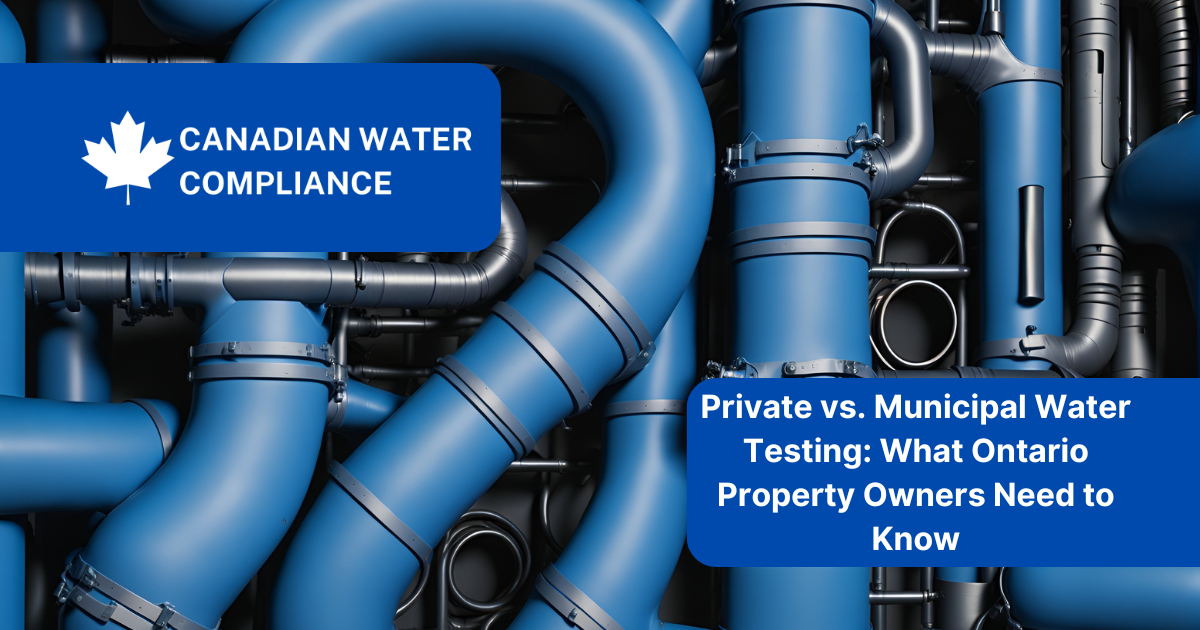
Written By: Canadian Water Compliance | On
If you’re a property owner or manager in Ontario, understanding your water testing obligations starts with one key distinction: are you connected to a municipal water supply, or do you rely on a private water source? This difference can significantly impact your legal responsibilities, risk exposure, and water safety protocols.
In this article, we’ll explore the core differences between municipal and private water systems, what testing requirements exist for each, and how building owners can stay compliant—while protecting their tenants, staff, and business.
Properties connected to a municipal water system receive treated and regulated water from their city or town. These systems are governed under Ontario Regulation 170/03 and managed by local municipalities, which are responsible for:
Treatment and disinfection of the water supply
Routine testing for bacteria, chemical parameters, and disinfection levels
Providing consumer confidence reports or notices in the event of contamination
However, your responsibility doesn’t end at the city’s supply line. Once water enters your building, you are responsible for maintaining water quality within your distribution system. This means:
Testing for Legionella in cooling towers, domestic hot water systems, and spas
Monitoring for lead, especially in older plumbing systems
Addressing stagnation in low-usage areas
Municipal systems do not test your internal plumbing or fixtures. That’s where proactive property management and compliance come in.
Buildings that draw from private wells, surface water sources, or other non-municipal systems fall under more stringent regulations. Under Ontario Regulation 319/08, non-municipal year-round residential systems and designated facilities (such as daycares, schools, and retirement homes) must:
Test regularly for E. coli and total coliforms
Submit samples to a licensed lab
Maintain records and take immediate corrective action when contamination is found
In many cases, additional parameters such as nitrates, arsenic, or lead may be recommended or required depending on local conditions or facility type.
Seasonal and semi-private operations (e.g., campgrounds, rural community centres) also have distinct testing schedules and requirements.
Failure to test water properly—whether municipal or private—can lead to serious consequences, including:
Fines and penalties from provincial health authorities
Civil liability in the case of illness or outbreak
Mandatory facility closures or service disruptions
Damage to brand reputation and tenant trust
A recent Legionella outbreak in Orillia led to a $3.25 million lawsuit against the municipality, underscoring the importance of documented due diligence.
Whether or not testing is legally required in your specific case, a failure to test puts your business and building occupants at risk.
Know Your Water Source: Understand whether your water is municipal or private and verify applicable regulations.
Test Beyond Compliance: Municipal water users should still test for Legionella, lead, and other in-building risks.
Establish a Testing Schedule: Regular, documented testing shows due diligence and protects you legally.
Hire Certified Professionals: Work with accredited labs and trained water technicians for reliable results.
Keep Meticulous Records: Document your sampling, results, and corrective actions for inspections or legal audits.
Whether your building is on city water or draws from a private source, Canadian Water Compliance offers turnkey services that help you stay compliant and safe:
Certified potable water and Legionella testing
Assistance with regulatory interpretation and documentation
Support for long-term water quality planning and outbreak prevention
We work with residential, commercial, and institutional clients across Ontario to ensure that water safety isn’t a question—it’s a guarantee.
When it comes to water quality, assumptions can be costly. Just because your water comes from the city doesn’t mean it’s safe after it travels through your pipes. And if you rely on a private source, the stakes—and the requirements—are even higher.
Whether municipal or private, your role in water testing is critical to protecting public health and ensuring compliance.
Contact Canadian Water Compliance to schedule your next test or build a custom water management plan today.